Ever walked into a room, flipped the switch, and jumped as your light bulb popped like a mini firework? It’s startling, isn’t it? You might wonder if it’s normal for light bulbs to go out with a bang.
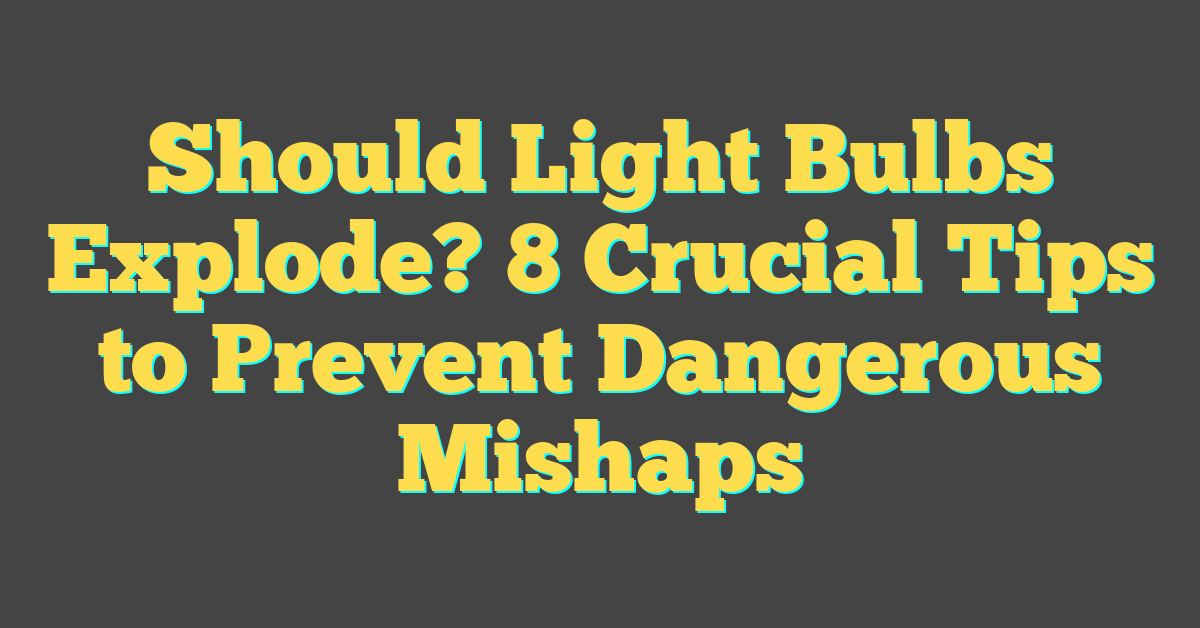
Light bulbs are a staple in every home, but when they explode, it’s not just surprising—it can be downright dangerous. You’re right to question whether this should be a common occurrence or a rare mishap.
Let’s shed some light on the reasons behind these explosive endings and if they’re something you should expect from your everyday bulbs. Stick around to illuminate the facts about light bulb safety and longevity.
Reasons Behind Exploding Light Bulbs
Exploding light bulbs can be a jarring experience. As a lighting enthusiast who loves to tinker with DIY projects around the house, you understand the importance of knowing what can go wrong with your fixtures. The causes of light bulb explosions might be less mysterious than you’d think. Discovering the reasons helps you prevent future incidents and maintain a safe home environment.
Flaws in the Glass
Sometimes the glass encasing the bulb’s filament can have imperfections. It’s not something you can easily spot with the naked eye, but even the tiniest crack or thin spot in the glass can lead to weakness. When the bulb heats up during operation, these weak areas can shatter unexpectedly.
- Manufacturing Defects: These can be air bubbles or inclusions within the glass.
- Impact Damage: Perhaps the bulb was knocked or dropped before installation, causing microfractures.
Overheating
Excess heat is a common culprit. Light bulbs emit heat, but:
- Incorrect Wattage: Using a bulb with higher wattage than your lamp or fixture can handle causes excess heat buildup.
- Insufficient Ventilation: Poorly ventilated or enclosed fixtures don’t allow heat to dissipate.
Electrical Surges
An unexpected spike in your electrical current can be devastating for the delicate components within light bulbs. This could be due to:
- Storm Activity: Lightning strikes sending surges through power lines.
- Power Outages: When the power comes back on, it can surge.
Moisture
Bathrooms and kitchens are common rooms where light bulbs may explode due to moisture:
- Condensation: When a hot bulb comes into contact with cold water.
- Leaks: Water from leaks or steam can settle on the bulb.
Understanding these factors isn’t just about being prepared. It’s about adopting a proactive mindset toward household safety by regular inspection of your lighting fixtures and being selective with your light bulb choices. Always match the bulb to the fixture specifications and consult with professionals if you’re ever in doubt. Your home’s lighting should be a source of comfort, not concern.
The Dangers of Exploding Light Bulbs
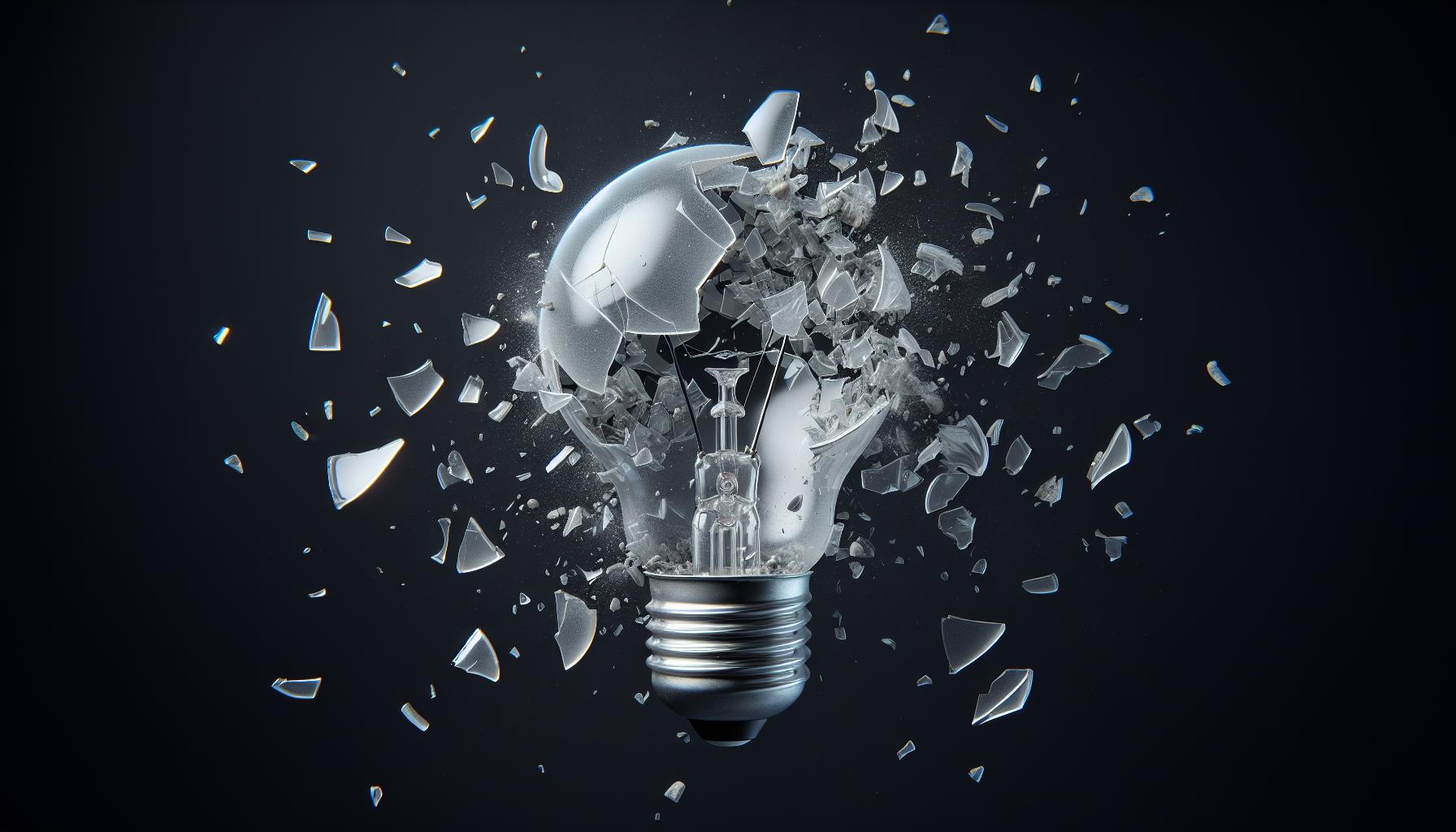
As you delve deeper into the fascinating world of home lighting, you’ll find that exploding light bulbs are more than just a startling nuisance; they can pose real dangers to your safe haven. When a bulb meets its explosive end, shards of glass can be catapulted in all directions, risking injury to anyone nearby.
Not only is there a physical threat, but exploding bulbs can also lead to electrical fires. If the filament sparks and ignites any flammable materials within its reach, the situation can escalate quickly. More so, if you’ve got a penchant for vintage finds and your home sports that chic, rustic wood everywhere, it’s crucial to ensure that your bulbs are in tip-top shape to circumvent any fiery mishaps.
What’s more, the sudden burst can create a short circuit, possibly damaging your home’s entire electrical system. This can be a shocking surprise, especially when you’re in the middle of a leisurely DIY project and suddenly find yourself in the dark, with your tranquil afternoon turned haywire.
To mitigate risks, it’s essential to implement precautions:
- Always purchase high-quality bulbs from reputable manufacturers.
- Check that you’re using the correct wattage for your fixtures.
- Ensure that your lights are installed in well-ventilated areas to stave off overheating.
Remember, amidst your home DIY adventures, lighting is both an ally for ambiance and functionality. By staying informed and vigilant, you’ll not only craft a lovely, well-lit space but also uphold the safety for you and your loved ones. Now, let’s shed some light on how to identify and deal with potential hazards associated with substandard or improperly used light bulbs. Keep a keen eye out for any irregularities in bulb performance, such as flickering or abnormal noises, and promptly address these signs to prevent the dangers associated with bulb explosions.
Is it Normal for Light Bulbs to Explode?
« What Happens If Light Bulbs Get Wet? The Shocking Truth Revealed
What is Wrong with LED Light Bulbs? Uncover Dimmer Dilemmas & Fit Fixes »
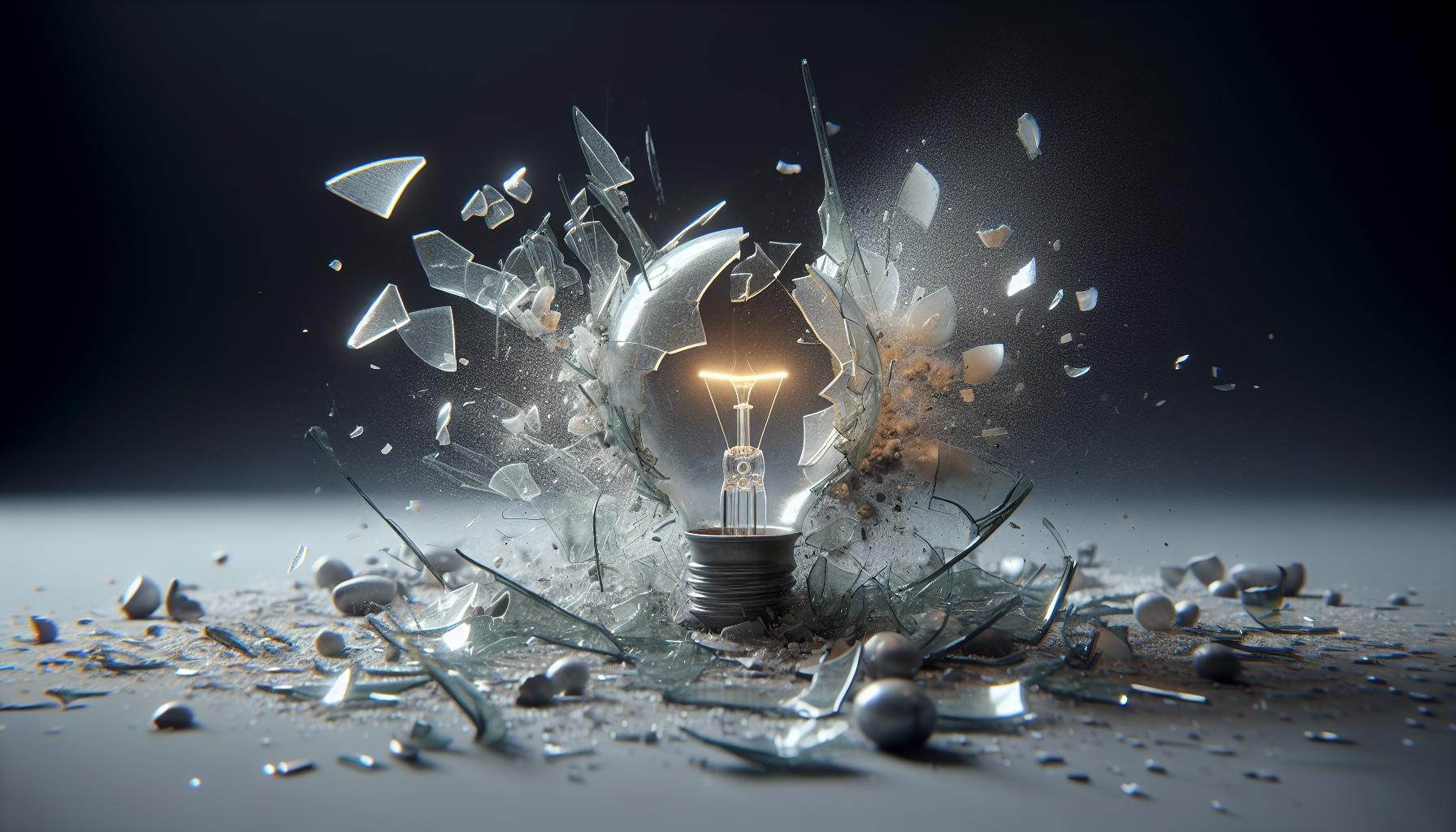
As an avid DIY enthusiast and lighting aficionado, you know that while light bulbs are designed to illuminate your space, they certainly aren’t built to shatter unexpectedly. Bulb explosions are rare, and when they occur, there’s usually an underlying issue at fault.
Mostly Due to Defects or Misuse
The truth is, if you’ve ever witnessed a light bulb popping or exploding, you’ve experienced something quite abnormal. Most bulbs, especially those from reputable manufacturers, go through rigorous testing to ensure they withstand everyday use. However, the occasional defect can slip through. Whether it’s a hairline crack in the glass or a fault in the filament, these imperfections can lead to failure under the right conditions.
Overheating Is a Common Culprit
Overheating is another common cause for light bulbs to burst. When bulbs are enclosed without proper ventilation, they can get too hot and, in turn, explode. It’s imperative to match the bulb’s wattage with your fixture’s rating. Place bulbs in open fixtures wherever you can to encourage air circulation.
- Ensure fixtures are clean and free from dust.
- Verify that no flammable materials are near bulbs.
- Use bulbs that have the correct wattage for your fixtures.
If you’re the kind of person who loves to tinker around the house, make the extra effort to inspect your light fittings periodically. Keep an eye on how your bulbs are behaving. Are they flickering? Do they seem to run hotter than normal? These can be telltale signs that something isn’t right, and addressing them early can prevent potential mishaps. Remember, staying proactive is key in avoiding the startling and potentially dangerous event of a bulb explosion. Always prioritize safety first in your DIY lighting projects.
Factors That Make Light Bulbs More Likely to Explode
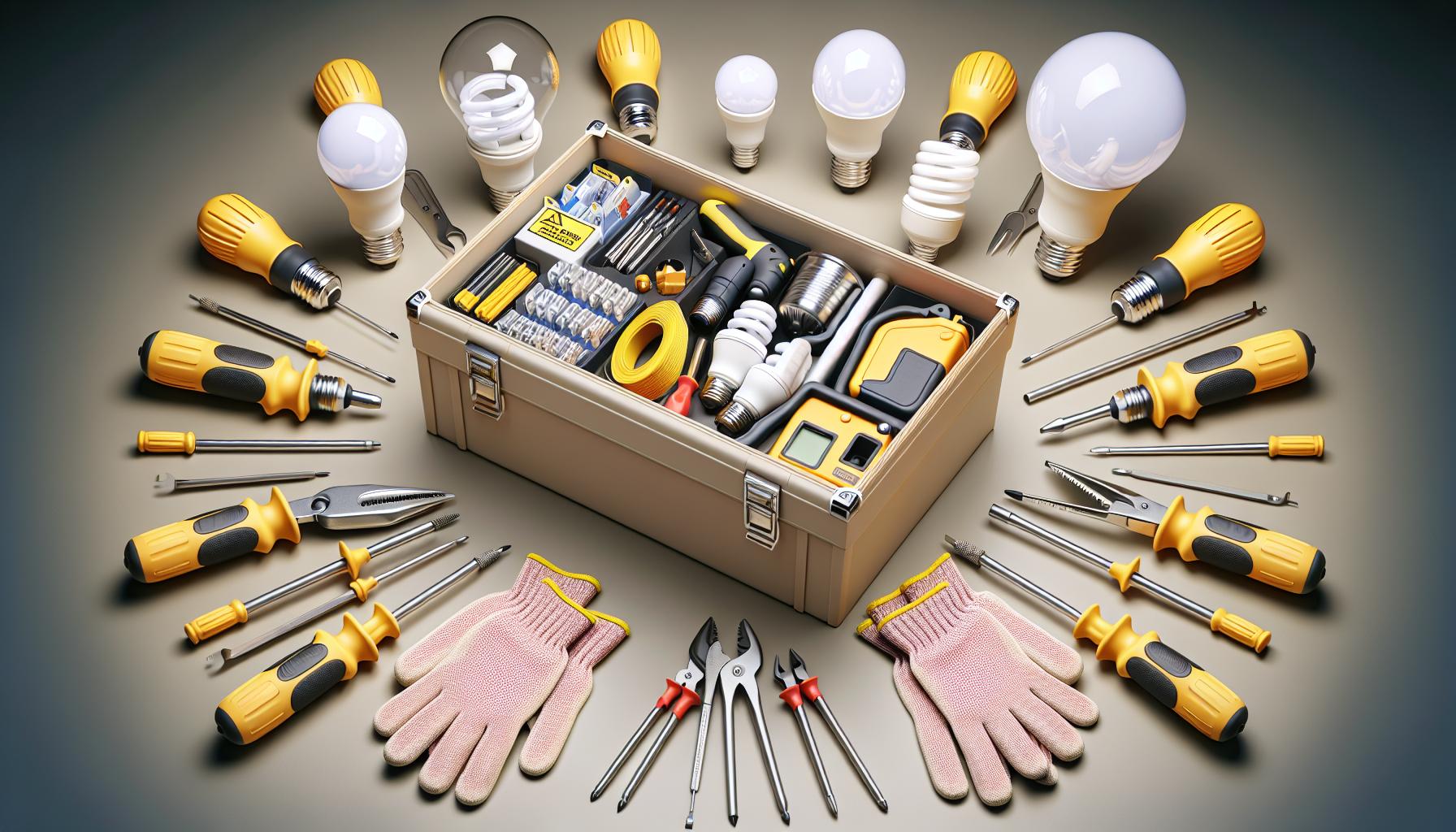
Light bulbs aren’t made to explode, so when it happens, you can bet there’s a reason. As a devoted DIY enthusiast and lighting aficionado, you know that the subtlest nuances in how you handle light bulbs can significantly impact their longevity and safety. Here’s a lowdown on what might up the ante for your light bulbs to sign off with a bang.
High Wattage in Low-Rated Fixures: It’s all about compatibility. If you’re installing a bulb that exceeds the fixture’s recommended wattage, you’re asking for trouble. The mismatch causes excessive heat, and here’s the kicker: Too much heat can lead to the bulb’s demise.
Voltage Fluctuations: Your home’s voltage should be like a calm ocean – steady. Spikes and drops in electrical current are like unexpected waves, battering against the light bulb, which can cause stress and eventually, breakage. Keep an eye on your home’s voltage consistency.
Faulty Wiring: Don’t underestimate the maze of wires nestled within your walls. A hiccup there can send a surge through the bulb or cause persistent high temperatures. Regular checks are your best defense against such sneaky culprits.
Cheap or Fake Bulbs: You get what you pay for. Bargain bulbs might save you some green now, but they’re often more prone to ending their show with a dramatic exit. Stick with verified, credible brands and dodge this easily avoidable issue.
Improper Bulb Handling: Remember how you’re told to handle bulbs with care? It’s not hogwash. Even the oils from your fingers can affect the bulb. Grab them by the base, not the glass, and if you touch the latter, give it a clean with a non-abrasive cloth.
Ground your DIY lighting projects with a solid understanding of these factors, and you’ll minimize the chances of your beautiful lighting display concluding with an unexpected pop. Light up your space smartly and stay in the know – it’s the best way to enjoy bright, safe illumination in your home.
Tips for Avoiding Exploding Light Bulbs
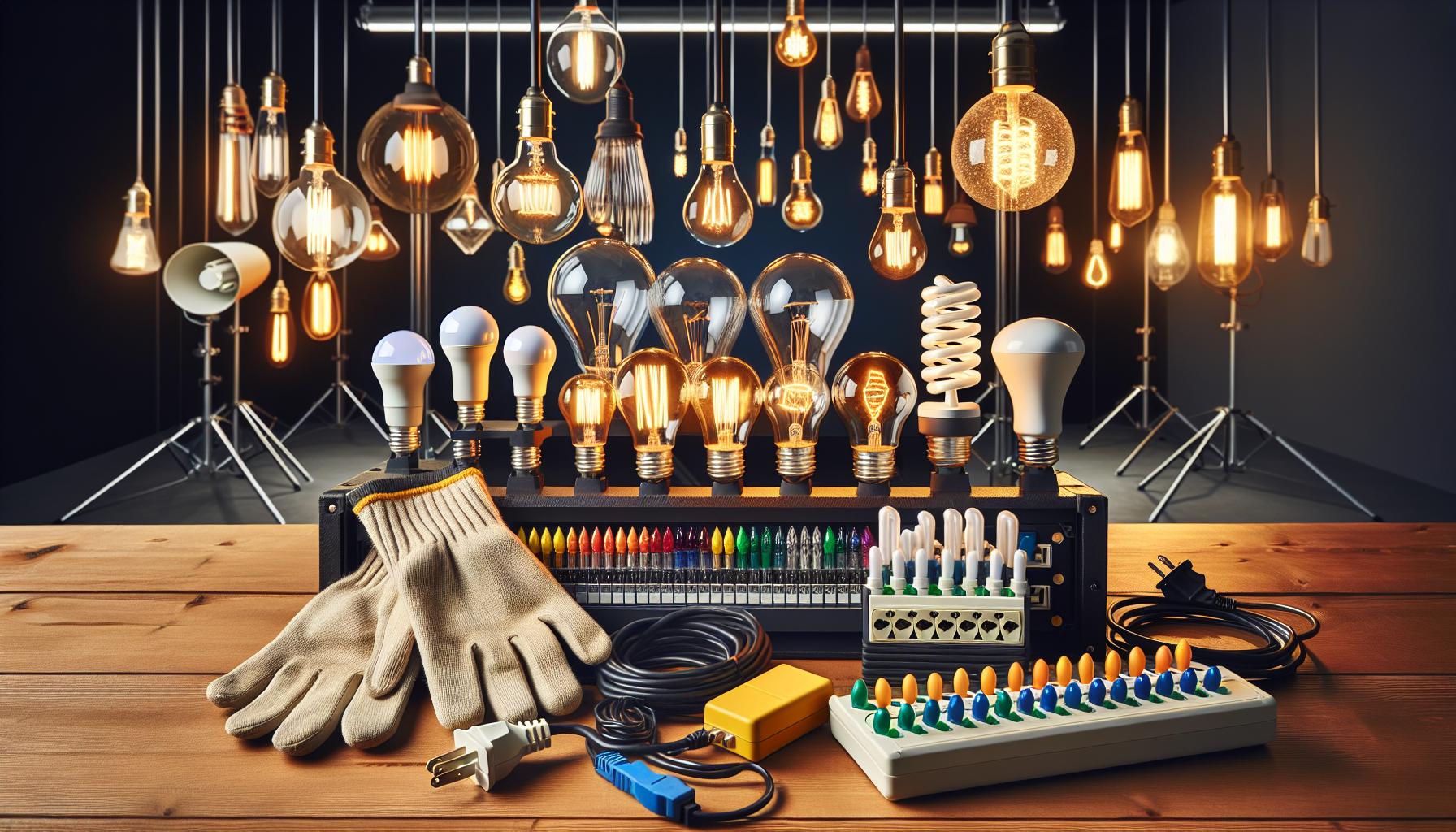
Nobody wants to deal with the aftermath of a light bulb explosion. It’s messy, dangerous, and downright inconvenient. Fortunately, there are several steps you can take to prevent your light bulbs from becoming mini fireworks.
Firstly, always match the bulb wattage to the fixture rating. Fixtures come with a maximum wattage rating for a reason; exceeding this limit generates excessive heat. Here’s a simple guide:
- If your fixture is rated for 60 watts, don’t go dropping in a 75-watt bulb.
- LED bulbs are your friends. They consume less power and produce less heat for the same amount of light.
Always purchase high-quality bulbs. Quality matters; reputable brands have strict quality control and testing. Though they may cost a bit more upfront, they save you from potential hazards and ensure longevity. When in doubt, look for certification marks from established standards organizations.
Pay attention to these key points:
- Check for marks like UL, ETL, or ENERGY STAR compliance.
- Avoid dubious brands or “too good to be true” deals.
Voltage fluctuations can be a silent bulb killer. Investing in a good surge protector can safeguard your bulbs from unexpected surges and prolong their life. For high-voltage areas, consider voltage regulators.
Proper bulb handling is also critical. Before installation, make sure your hands are clean or wear gloves to prevent natural oils from your skin from transferring onto the bulb. This is especially true for halogen or incandescent bulbs, which can get hotter at points where oils have been deposited, increasing the chance of an explosion.
Regular maintenance can’t be overstated. Ensure that:
- Your fixtures and wiring are routinely checked and are in good condition.
- Dust and debris are regularly cleared from lampshades and fixtures.
Embrace the habit of turning off lights when not in use; it reduces stress on your bulbs and extends their lifespan. By being attentive to the little things, you’ll enjoy a well-lit environment that’s safe and secure without any unexpected popping sounds.
Conclusion
So there you have it! By taking the right precautions and being mindful of your light bulb usage, you can significantly reduce the risk of an unexpected pop and sizzle overhead. Remember, it’s all about being proactive with your lighting choices and maintenance. Stay safe, keep your home well-lit, and never hesitate to go the extra mile for that peace of mind. Your home’s lighting should be a source of comfort, not concern. Happy illuminating!
Frequently Asked Questions
What is the best way to prevent light bulb explosions?
To prevent light bulb explosions, ensure the bulb wattage matches your fixture’s rating, consider using LED bulbs for their durability, buy high-quality bulbs from reputable manufacturers, and look for certification marks that show safety standards compliance.
Are LED bulbs safer than traditional bulbs?
Yes, LED bulbs are generally safer as they produce less heat, are less prone to overheating, and have a lower risk of causing explosions compared to traditional incandescent or halogen bulbs.
How can purchasing high-quality bulbs help avoid explosions?
High-quality bulbs are designed with better materials and manufacturing processes, reducing the chance of faults that can lead to explosions. They often come with warranties, ensuring replacements if defects occur.
What is the importance of certification marks on light bulbs?
Certification marks indicate that a light bulb meets specific safety standards set by recognized testing organizations. These standards ensure that the bulb is safe for use and less likely to explode due to electrical issues.
Can voltage fluctuations cause light bulb explosions?
Yes, voltage fluctuations can cause light bulb explosions by creating excess heat or electrical stress. Using surge protectors and voltage regulators can help mitigate this risk by maintaining a stable current to your bulbs.
Is regular maintenance of light bulbs necessary?
Regular maintenance, such as cleaning and checking for any signs of wear or damage, is crucial to ensure the proper functioning of light bulbs and to prevent potential explosions.
Does turning off lights reduce the risk of bulb explosions?
Turning off lights when they are not in use can reduce the risk of bulb explosions by minimizing the operational hours and heat accumulation, which lowers the stress on the bulb.




